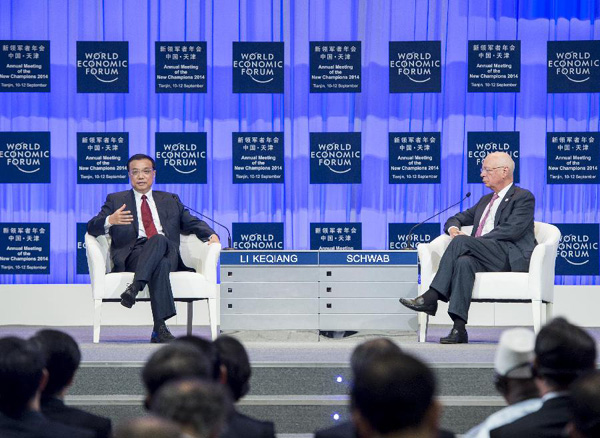 |
|
Chinese Premier Li Keqiang (L) answers questions raised by Klaus Schwab, founder and executive chairman of the World Economic Forum (WEF), after delivering a keynote speech at the opening of the Annual Meeting of the New Champions 2014, also known as the Summer Davos forum, in Tianjin Municipality, North China, Sept 10, 2014. [Photo/Xinhua] |
TIANJIN - In the past, when China's economic growth slipped to a level that threatened the job market, the government would loosen credit and embark on a construction binge.
When the debt burden and industrial overcapacity made another monetary injection unfeasible, reforms like deregulation became the path of choice to offset the dwindling effects of investment.
The change of medicine, according to Chinese Premier Li Keqiang, has been proved just as effective.
Li on Wednesday told global CEOs at Summer Davos that it was reform that had improved China's job market, when dwindling growth should really have dragged things down. China, he said, now relies on strong reforms rather than strong stimulus.
The key to reforms is a clear delineation between market and government. About one third of administrative approval items have evaporated since the new leadership took office two years ago, a goal Li promised to achieve within five years.
Financial and fiscal reforms have come thick and fast. Restrictions on lending rates have been lifted; market friendly monetary regulation have been rolled out; private-owned banks are open for business; Shanghai's free trade zone is testing the most contentious matters, such as the liberalization of cross-border capital flow.
All this, combined with targeted stimulating measures, means a 7.4 percent growth in the first half this year, despite weak industrial production and a cooling property market.
Nearly 10 million new urban jobs were created in the first eight months, the government's top concern. Because of the healthy labor market, economic fluctuations, such as declining PMI and power consumption, are deemed reasonable.
This year' s 7.5 percent GDP growth target seems well within reach.
So the leadership has more room to push more structural reform and aggressive policy loosening can be forgotten about, for now.
As Li promised, monetary policy is stable and sustainable and employment spurs the economy, but the course of true reform never runs smooth. Breaking vested interests will certainly bring fierce opposition. China is ready to face whatever the future brings.
